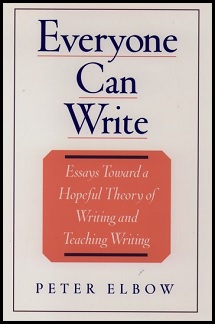EVERYONE CAN WRITE
TABLE OF CONTENTS
Introduction xiii
1 PREMISES AND FOUNDATIONS 1
Illiteracy at Oxford and Harvard: Reflections on the inability to write 5
A map of writing in terms of audience and response 28
The uses of binary thinking 48
Fragment: The believing game - A challenge after twenty-five years 76
2 THE GENERATIVE DIMENTSION 81
Freewriting and the problem of wheat and tares 85
Closing my eyes as I speak: An argument for ignoring audience 93
Toward a phenomenology of freewriting 113
Fragment: Wrongness and felt sense 137
Fragment: The neglect and rediscovery of invention 141
Fragment: Form and content as sources of creation 142
3 SPEECH, WRITING, AND VOICE 145
The shifting relationships between speech and writing 149
Voice in literature 168
Silence: A collage 173
What is voice in writing? 184
Fragment: On the concept of voice 222
Fragment: Audible voice: How much do we hear the text? 223
Fragment: Voice in texts as it relates to teaching 226
4 DISCOURSES 229
Reflections on academic discourse: How it relates to freshmen and colleagues 235
In defense of private writing: Consequences for theory and research 257
The war between reading and writing -- and how to end it 281
Your cheatin' art: A collage 300
Fragment: Can personal expressive writing do the work of academic writing? 315
5 TEACHING 319
Inviting the mother tongue: Beyond "mistakes," "bad English," and "wrong language" 323
High stakes and low stakes in assigning and responding to writing 351
Breathing life into the text 360
Using the collage for collaborative writing 372
Fragment: Being a writer vs. being an academic: A conflict in goals 379
Fragment: Separating teaching from certifying 386
Fragment: What kind of leadership is best for collaborative learning? 392
6 EVALUATION AND GRADING 395
Getting along without grades - and getting along with them too 399
Starting the portfolio experiment at SUNY Stony Brook (w/ Pat Belanoff) 422
Fragments:
Problems with grading 435
The conflict between reliability and validity 438
How portfolios shake up the assessment process and thereby lead to minimal holistic scoring and multiple trait scoring 441
Multiple trait scoring as an alternative to holistic scoring 443
Tracking leads to a narrow definition of intelligence 444
The benefits and feasibility of liking 447
Writing assesment in the twenty-first century: A utopian view 453
PUBLISHED WORKS BY PETER ELBOW 471

Oxford University Press, 1985

